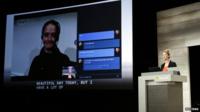12 December 2014
Last updated at 12:54
By Dave Lee Technology reporter, BBC News

Please turn on JavaScript. Media requires JavaScript to play.
Facebook founder Mark Zuckerberg says his site is "thinking about" how to implement a way to dislike posts (Video credit: Facebook).
Facebook is thinking about adding a way to "dislike" posts on its site, founder Mark Zuckerberg has said.
Speaking at a Q&A session in California, he said it was one of the most requested features the social network receives from its users.
He said the site would need to find a way to make sure it did not become a way to demean people's posts.
According to Facebook's own figures, 4.5 billion "likes" are generated every day.
"One of things we've thought about for quite a while is what's the right way to make it so that people can easily express a broader range of emotions," Mark Zuckerberg told an audience at Facebook's headquarters.
"A lot of times people share things on Facebook that are sad moments in their lives. Often people tell us that they don't feel comfortable pressing 'like' because 'like' isn't the appropriate sentiment.
"Some people have asked for a dislike button because they want to say, 'That thing isn't good.' That's not something that we think is good for the world.
"The thing that I think is very valuable is that there are more sentiments that people want to express."
Fake likes Facebook's Like button has been criticised as being a method by which the social network collects data on its users' browsing habits.
The system has also come under fire due to a high volume of "fake likes" - when the popularity of a brand or piece of content is inflated artificially.
Facebook has moved to combat the trade of so-called "like farming" - businesses that, for a price, will provide a huge number of likes quickly. This will be via automated robots, or by a network of humans paid a tiny sum for each click.
An investigation by the BBC in July 2012 showed that a fake company, set up by the BBC, could gain thousands of "likes" - despite the fact that the company, which promised bagels via the internet, was quite clearly bogus.
On closer inspection, many of the "likes" appeared to come from accounts that were not real people. Hardly any of the "likes" originated from places like the UK or US - instead the majority originated in places such as the Philippines.
Facebook has initiated legal action against firms offering "fake likes" or other bogus business practices on the social network.
Nervous advertisers Any enhanced method for expressing sentiment - particularly negatively - would be likely to make advertisers nervous, said Paul Coggins, chief executive of ad firm Adludio.
"Facebook's big concern is revenue," he told the BBC.
"They need to keep their advertisers happy. I would think it highly unlikely that they would come up with a button that says you can 'dislike'.

Please turn on JavaScript. Media requires JavaScript to play.
Rory Cellan-Jones explores the merits of Facebook advertising, by setting up a bogus bagel company online
"I think they will extend the success of the like button, which has been huge. Rather than have a quick yes-no, which is a bit black and white, my guess is that they'll probably look to do something with a bit more sentiment around it."
Mr Coggins suggested buttons which would indicate how a user feels, rather than a direct "dislike".
Guy Phillipson, chief executive of the Internet Advertising Bureau UK, said brands are now used to being openly criticised online.
"If brands do put something out which people don't like, they find out pretty quickly. It's been a force for good - advertisers know more about tone, or when they've gone too far."
Follow Dave Lee on Twitter @DaveLeeBBC



